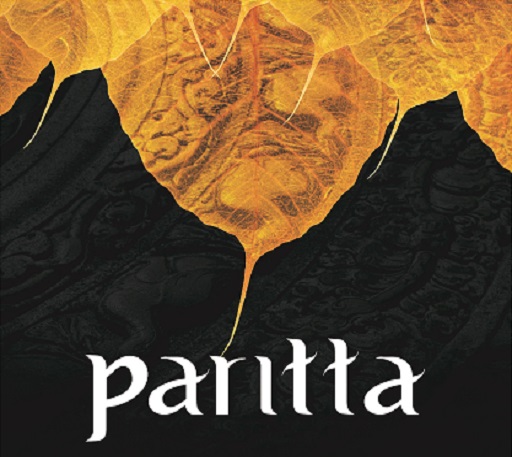No. 227.
GŪTHA-PĀṆA-JĀTAKA.
“Well matched,” etc.–This story the Master told while dwelling at Jetavana, about one of the Brethren.
There stood at that time, about three-quarters 1 of a league from Jetavana, a market town, where a great deal of rice was distributed by ticket, and special meals were given. Here lived an inquisitive lout, who pestered the young men and novices who came to share in the distribution–[210] “Who are for solid food? who for drink? who for moist food?” And he made those who could not answer feel ashamed, and they dreaded him so much that to that village they would not go.
One day, a brother came to the ticket-hall, with the question, “Any food for distribution in such-and-such a village, sir?” “Yes, friend,” was the answer, “but there’s a lubber here asking questions; if you can’t answer them, he abuses and reviles you. He is such a pest that nobody will go near the place.” “Sir,” said the other, “give me an order on the place, and I’ll humble him, and make him modest, and so influence him that whenever he sees you after this, he’ll feel inclined to run away.”
The brothers agreed, and gave the necessary order. The man walked to our village, and at the gate of it he put on his robe. The loafer spied him–was at him like a mad ram, with “Answer me a question, priest!” “Layman, let me go first about the village for my broth, and then come back with it to the waiting hall.”
When he returned with his meal, the man repeated his question. The brother answered, “Leave me to finish my broth, to sweep the room, and to fetch my ticket’s worth of rice.” So he fetched the rice; then placing his bowl in this very man’s hands, he said, “Come, now I’ll answer your question.”
p. 148
Then he led him outside the village, folded his outer robe, put it on his shoulder, and taking the bowl from the other, stood waiting for him to begin. The man said, “Priest, answer me one question.” “Very well, so I will,” said the brother; and with one blow he felled him to the ground, bruised his eyes, beat him, dropped filth in his face, and went off, with these parting words to frighten him, “If ever again you ask a question of any Brother who comes to this village, I’ll see about it!”
After this, he took to his heels at the mere sight of a Brother.
By and bye all this became known among the Brotherhood. One day they were talking about it in the Hall of Truth: “Friend, I hear that Brother So-and-so dropped filth in the face of that loafer, and left him!” The Master came in, and wanted to know what they were all talking about as they sat there. They told him. Said he, “Brethren, this is not the first time this brother attacked the man with dirt, but he did just the same before.” Then he told them an old-world tale.
[211] Once on a time, those citizens of the kingdoms of Aṅga and Magadha who were travelling from one land to the other, used to stay in a house on the marches of the two kingdoms, and there they drank liquor and ate the flesh of fishes, and early in the morning they yoked their carts and went away. At the time when they came, a certain dung-beetle, led by the odour of dung, came to the place where they had drunken, and saw some liquor shed upon the ground, and for thirst he drank it, and returned to his lump of dung intoxicated. When he climbed upon it the moist dung gave way a little. “The world cannot hear my weight!” he bawled out. At that very instant a maddened Elephant came to the spot, and smelling the dung went back in disgust. The Beetle saw it. “Yon creature,” he thought, “is afraid of me, and see how he runs away!–I must fight with him!” and so he challenged him in the first stanza:–
“Well matched! for we are heroes both: here let us issue try:
Turn back, turn back, friend Elephant! Why would you fear and fly?
Let Magadha and Aṅga see how great our bravery!”
The Elephant listened, and heard the voice; he turned back towards the Beetle, and said the second stanza, by way of rebuke:–
“Non pede, longinquave manu, non dentibus utar:
Stercore, cui stercus cura, perisse decet.”
[212] And so, dropping a great piece of dung upon him, and making water, he killed him then and there; and scampered into the forest, trumpeting.
_____________________________
When this discourse was ended, the Master identified the Birth:–“In those days, this lout was the dung-beetle, the Brother in question was the elephant, and I was the tree-sprite who saw it all from that clump of trees.”
Footnotes
147:1 Gāvutaddhayojanamatte. It may possibly mean ‘an eighth.’

![[PDF] The book of the Discipline – Vinayapiṭaka – The full 6 Volumes](https://en.namo84000.org/wp-content/uploads/2023/12/The-Book-of-the-Discipline-Vinaya-Pitaka.jpg)


![[En] Guide to Tipitaka](https://en.namo84000.org/wp-content/uploads/2021/10/Kinh-Phat-Quan-trong-2.jpg)